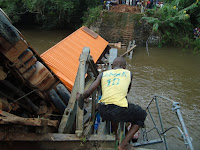Hello hello from DR Congo! I am very glad to be back in the little
village of Epulu, after a very very long trip in the exterior. Had a
fantastic albeit somewhat tiring trip!! This included two real
workshops and one pseudo-workshop and altogether lots of moving around
and not a lot of real work. The first week I attended a workshop in
Butare, Rwanda at the National University. They have an extremely
impressive Center for GIS (housed in the former French Cultural Center
building) and their staff have high competence and capacity to provide
training and services to the region. My host Bob, is an American man
who is setting up an MSc program in GIS, which should be off the
ground soon and hopefully attracting Congolese and other students from
the region. It was really fun to be in the workshop with 15
intelligent, motivated conservationists from Rwanda, Congo and Uganda.
Also its a little easier for me in Rwanda because it recently adopted
English as an official language. Very nice to meet people my age
working for the government or in the national parks system studying
species like the golden monkey of Volcanoes, conservation of forest
fragments which hold small populations of chimpanzee, and setting up a
community reserve in Congo to protect eastern lowland gorillas - the
most threatened of all great apes.
After the workshop, I met up with the Myhres - World Harvest
missionary doctors who have raised their family in Bundibugyo, Uganda,
and Ashley, one of the mission's teachers. This was their first ever
visit to their neighbor Rwanda and were shocked at the border by
having to switch which side of the road they were driving on, and not
being hassled for a visa fee. Rwanda has no visa requirement for
Americans and several other countries - making it a really easy place
for tourists to come. The people are absolutely wonderful too and the
country has caught on to making tourists and guests comfortable. Its
a good place to be!
After Butare, Ashley and I split off from the Myhres who headed via
Serengeti and Tanzania to take their two oldest to boarding school
outside Nairobi. In Kigali, my friend Peter from Clark Univ., drove
us all around the city and showed us how clean and developed it is. I
was really shocked in Kigali to be handed a helmet when hailing a
motorbike taxi! We had a great visit. Then we got on a big slow bus
back to Kampala, Uganda where I had another workshop - this one was
setting priorities for the conservation of eastern chimpanzees - which
are found in DR Congo, Uganda, Rwanda, Burundi, Tanzania and a few in
CAR and Sudan. Congo probably has 95% of the population, but
estimates have very little confidence. There are unexplored intact
forest blocks the size of some of the other countries within eastern
chimp range which had zero information - biologists had seemingly
never gotten there. Hopefully WCS will be able to get into some of
these places and also get to know some known populations better so as
to preserve them, because they're undoubtedly most threatened in Congo
too because of imminent forest degradation and continued preferences
for bushmeat - which are minimal concerns in other range countries.
I also loved returning to Uganda - Kampala and a few days in Entebbe -
the people are lovely, and I have many friends there. As fortune had
it, the Massos were in Kampala on a break from their home in Sudan,
and my friend Godfrey, who I taught with in Bundibugyo lives there now
too. He's an earnest man of faith and a dear friend, who I've been
able to keep in touch with over the last few years. Very fun to see
them and other familiar faces at some of the hotels.
After a long week - we took several days in getting back to Epulu -
slow going but good. We stayed in Kampala again, Kasese in western
Uganda at a great cheap ($21) hotel with a health club, sauna, and
steam room(!) before hopping back across the border to Beni. We were
greeted at the border with some low grade hassling - a sign that some
"civil servants" still have a ways to go. Nevertheless - the trip
through Virunga National Park afforded some glorious views of savannah
grass lands, forests, and the Rwenzori - mountains of the moon.
In Beni, it was nice to meet Meredith and Grant, two Americans who are
teaching and working at the Bilingual Christian University of Congo,
probably the only bilingual university in the country - and also a
higher ed institution with a new vision rather than most which are
either crumbling or rebuilding. It aims to change Congo with the
renewal that Christ affords us all. Certainly Congo has so many
needs, and renewal with start with this hope! Its off the ground
thanks to good leadership; the founder is a local Congolese man,
PhD-educated in the US, who has developed decent fund-raising through
the American NGO "The Congo Initiative".
Check it out: http://www.congoinitiative.org/
Anyways it will be fun to hang out with a bunch of Christian American
"wazungus" (Swahili regional word for little kids - acceptable and
adults - rude - to call me and other white folks) when I go to Beni
from time to time.
Now I'm glad to be back in Epulu - the place where the monkeys
frolick, the rain pounds, the river rushes, and the moon and stars
glow of the dirt tracks and tin roofs. I think my gladness for the
return is a good sign that Epulu is becoming home!










